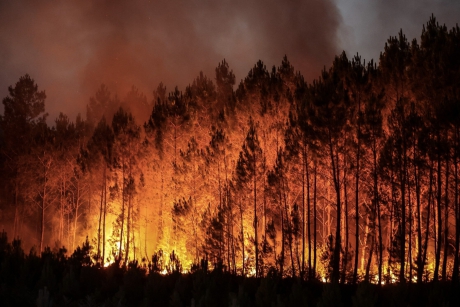News
You are here
Canada breaks wildfire record

June 27, 2023
It's official. As of June 26th, a greater area of forest in Canada has been burned than in any other year since monitoring began. The figure is 7.7 million hectares - almost the size of the Czech Republic - and climbing.
There have been almost 3,000 fires - about 20% higher than the 10-year average and almost 500 are still burning. More than half of these fires are considered 'out of control'. People in cities across the country have routinely woken up to smoky skies and have registered some of the worst air quality readings in the world.
While forest fire statistics vary greatly year on year, there are long term trends that can be observed: downward for the number of fires, and upward for area burned.
The higher temperatures and drier conditions that have made this fire season catastrophic are linked to the climate crisis and the burning of fossil fuels. But forest management practices more attuned to the needs of the forestry industry than to ensuring healthy forests is also a major factor.
For millennia, Indigenous peoples lived in and around the forests on Turtle Island, developing knowledge and practices in harmony with the ecosystems they were embedded in. Fire management, including controlled burns and tree and undergrowth maintenance to minimize destruction while fostering rebirth formed a part of these practices. Far from wilderness, the forests on this continent were stewarded by the peoples that lived in their midst, ensuring a rich diversity of plants and animals for the benefit of all species.
Capitalist settler colonialism displaced Indigenous peoples from the forest lands, relegating forests to logging interests that only saw value in the products that could be made from cutting down trees. Fire management shifted towards attempts at total fire suppression to preserve the future value for private interests. Management of undergrowth and the creation of fire-breaks around communities was neglected. The paradoxical result is the periodic forest fire catastrophes that have marked the last hundreds of years.
Global capitalism and imperialism have been fueled by coal, oil and gas. Since WWII fossil fuel use has risen exponentially, with atmospheric CO2 rising in lockstep and leading to global average temperature increases as predicted by climate scientists. Governments first committed to reduce emissions in 1988, but the intervening 35 years has seen more than half of the increase of atmospheric CO2.
The Canadian government continues to fund the fossil fuel industry with billions in direct subsidies and more billions that support the capitalists indirectly through infrastructure decisions that perpetuate the use of fossil fuels. Oil and gas profits ensure market mechanisms that claim to lead a transition to renewable energy sources will have limited effect.
Forestry profits are similarly safeguarded by governments who oversee clear cut logging licences on crown land and forestry product export negotiations.
The truth is that capitalism is burning the planet for the short term benefit of a tiny minority. The profits they feed on are based on the blood and sweat of the millions who labour and the ongoing colonization of Indigenous peoples and lands to clear the path for further resource extraction. But increasingly workers are fighting back against the exploitation of their labour, and Indigenous peoples are actively asserting their inherent rights over their lands. A livable future depends on forging links between these struggles to build a force from below that can pull the emergency cord and bring this destructive economic system to a halt before it's too late.
Section:









